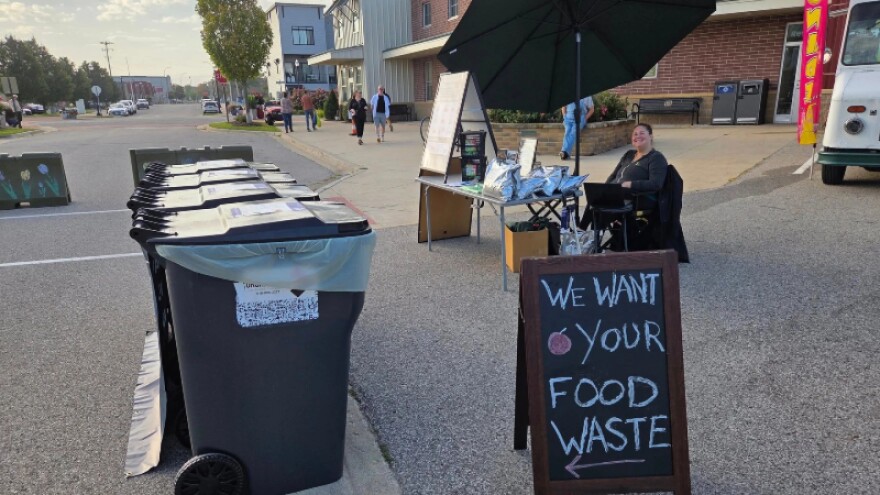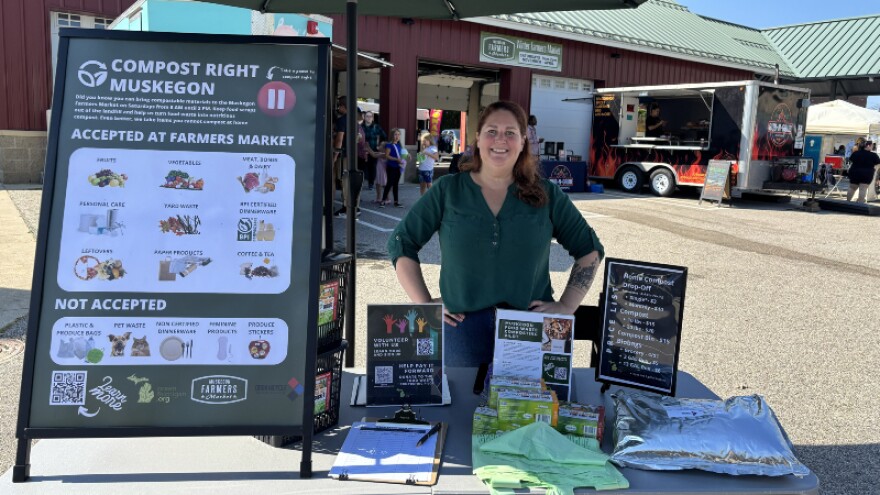Angela Fox: Green Michigan is a West Michigan nonprofit. It was started in 2015 by myself and two other colleagues who really wanted to make sustainability education and sustainability programming less overwhelming for people. When you think about sustainability, you tend to get a little doom and gloom and overwhelmed. And we wanted to really put a positive spin on that and make sustainable transitions more empowering, led by curiosity and just really much more positive. This is a way that we try to educate and inspire. It's a very project-based nonprofit. So we take on initiatives all across the state, but I am recently relocated here to Muskegon.
David Limbaugh: Talk to me about how this composting program got started.
Angela Fox: Prior to living here in Muskegon, I was the sustainability manager for the city of Royal Oak, which is a suburb just north of Detroit. The farmers market was right next door to City Hall and I wanted to help people take a first step towards sustainability and thought a composting program at a farmers market just makes a lot of sense. So I started a program there in 2023 and it just had crazy results. I ran that program, however, as a city employee. And so when I moved to Muskegon having had a successful program on the other side of the state, I was curious if we could replicate it at the Muskegon Farmers Market, but under a nonprofit model. And so the logistics are the same, but there's a little bit of a difference in the fact that this is something that I personally am funding with the hopes that we can get enough interest to make it sustainable and in a long-term program at the farmers market.
David Limbaugh: So the Royal Oat Composting Program was successful?
Angela Fox: Yeah. You know, when you think about trash carts, you know, some people have 96 gallon like here in Muskegon, ours are 96. In Royal Oak we had 64 gallons, so just a little bit smaller. We were filling 12 to 13 of those with food waste every single Saturday. And so I had the idea that, you know, with Muskegon Farmers Market being much bigger in size, we have 100 vendors on a Saturday at the Muskegon Farmers Market and much higher attendance. I just figured that there would be a great base of passionate individuals who are already supporting local farmers and vendors that would maybe be curious to a program such as this.
David Limbaugh: So you've been doing this in Muskegon for about a month now?
Angela Fox: It's actually been a little bit longer. We started it on August 2nd, but we recently moved to a new location. And frankly, that new location has been a game changer. We're now right in the middle of the market, right by the stage and the food vendors and the restrooms. So we're getting a lot more traffic and that is helping us really build and promote the program a lot more successfully.
David Limbaugh: Talk to me about the process. How do people utilize this service?
Angela Fox: Yeah, that's the most popular question that we get is, "Okay, you want my food waste, but how?" And the reality is everyone does it a little bit differently. And that's the piece I actually get really excited about. I really want to hold a competition for who brings their compost in the weirdest way, uh because we have all sorts of people using all sorts of containers. We really encourage people to reuse something that they already have. I didn't really want to buy a bunch of plastic buckets or create more waste essentially. And so we're asking people to reuse things. So we have people bringing things in kitty litter tubs. I think my favorite so far has been an old ice cream container from the 80s, if you remember those, where it was like a gallon of ice cream with a little plastic lid. But we can also have people bring it in, know, grocery bags, plastic grocery bags or we sell compostable bags at the market that can go right inside of the bin. The only thing we ask is that if you bring it in plastic, whether it be plastic packaging or still even maybe the wrapper that the food is in, we just ask that you remove all plastic that's our number one contaminant. And we try to educate to keep that out of the bin as much as possible.

David Limbaugh: And to help with that effort, you charge a nominal fee?
Angela Fox: We do. Yeah, we sell the bags pretty much at cost. We have three different sizes. And then as I mentioned before, this is a nonprofit model. We're actively applying for grants, but right now we're hoping for community support when they're participating. A one-time drop-off is $3 for up to two five gallon buckets. A once a week drop-off or, you know, a monthly kind of unlimited is $10 a month, or we encourage people to volunteer and one three hour shift on a Saturday morning gets you free composting for the month as well. And so we've tried to reduce as many barriers. participation as we can, but we're hoping with grant funding we can take it even further and make it more accessible for people and that's something we're actively exploring.
David Limbaugh: Who have you reached out to in regards to grants?
Angela Fox: Yeah, we have applied for a grant from the Muskegon Community Foundation and then we've also applied for a next cycle grant which is facilitated through EGLE, which is the state environmental department.
David Limbaugh: Is this your full-time job or is this a side business?
Angela Fox: I would say that this is a weird hobby at this point. I am a full-time sustainability consultant with an organization called ICLEI. We help local governments with their sustainability transitions. So that is my nine to five. And then this is really just something that I do out of the passion of wanting to keep food waste out of the landfill, out of all of the wicked problems related to sustainability. And we often refer to them as wicked problems because they're interconnected, they're complex. They can be, as I mentioned before, overwhelming. This is a relatively easy one to solve. You know, let's just not landfill food waste. Let's get food into the hands of people who are food insecure through food rescue. Let's try to compost food when that's not possible. You know, to me, this is a very easy, tangible thing that people can do that allow them to take action and feel like they're a part of something that's making the planet healthier. And so this is for me, a very introductory way to introducing people to being more sustainably focused or sustainably minded.
David Limbaugh: What are your hopes for this program?
Angela Fox: I would love to see this program become a community program. And so it's not just somebody like me championing it, but it's the community coming together to support and grow it. Ultimately, I would love to see multiple farmers markets offering programs like this. To me, it just makes sense. But I also think that local governments can play a role in having these types of drop off stations throughout their communities. You know, we want to reduce contamination, so we don't necessarily just want bins open for the public to use. There has to be education that goes along with that. But ultimately, I think most communities are really hoping for a curbside option. You know, just like you can throw away your trash or you can recycle. You know, here in Muskegon, we only are able to recycle once a month. I'm hoping that that can change and grow and evolve. But I'm also hoping at some point with my yard waste, I could also put my food waste.

David Limbaugh: For those who don't know, could you explain why it's important to compost your food rather than letting it go to a landfill or down your drain into a garbage disposal?
Angela Fox: Yeah, absolutely. We really want to educate people that the garbage disposal, while it might look enticing, is really something that you should not be putting food waste down your drain. It can clog pipes. It creates issues for water treatment plants and municipalities. And then by land filling food, you're doing is you're putting methane gas into the atmosphere. And what we know is as food breaks down, releases that methane gas. know that methane gas is more harmful than carbon dioxide when it comes to accelerating climate change. And so we're just trying to do our best to keep those materials out of the landfill and trying to handle them more responsibly. And so the state of Michigan actually has a goal to cut food waste in half by 2030. A lot of that pressure is kind of trickling down to local governments and organizations like mine. But luckily there has been a food waste coalition that has just started here in the state of Michigan with all of the key players and actors that have a hand in reducing food waste. And we're all working together through this coalition to try to tackle it strategically, cohesively, and throughout the entire state. So I'm pretty optimistic that we'll put a big dent into that goal if not reaching it, hopefully maybe even like succeeding above that. This is a program that is loved by residents. I think it's something that at first there may be a little put off by, and then they try it and they get a little curious and then they get a little bit excited and they start to really see how much food they may be wasting every week. And that translates into being better shoppers. That translates into being better consumers of food. It's going to make you think twice about those leftovers. And I think that that's a really exciting part of this program is that it really is an introduction towards a more sustainable lifestyle. I kind of joke that I'm ruining people one Saturday at a time, but for the greater good, because once you start diverting your food, have a really hard time stopping. And that's ultimately why I started this program was I had no solution for my own food waste. So I was like, "All right, well, I guess we're going to try this program here." The Muskegon Farmers Market is a full time year round market, so originally, when we started the program, we had committed to three months at the end of October. That will be kind of that three month deadline. I'm pretty sure that we're going to keep the program moving forward, especially with the recent support that we've just received this week. And essentially the market transitions to an indoor market, like, kind of, I think, mid November. So once the times get to be too cold for people to be outside, they transition indoors. And the hope is that we'll have enough community support and we'll figure things out to make it a permanent addition to the market and be there year-round.
David Limbaugh: Angela Fox with Green Michigan, thank you so much for speaking with us today.
Angela Fox: Absolutely, thank you so much. I appreciate your time.




